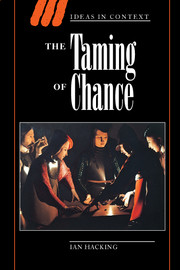Book contents
- Frontmatter
- Contents
- Acknowledgements
- 1 The argument
- 2 The doctrine of necessity
- 3 Public amateurs, secret bureaucrats
- 4 Bureaux
- 5 The sweet despotism of reason
- 6 The quantum of sickness
- 7 The granary of science
- 8 Suicide is a kind of madness
- 9 The experimental basis of the philosophy of legislation
- 10 Facts without authenticity, without detail, without control, and without value
- 11 By what majority?
- 12 The law of large numbers
- 13 Regimental chests
- 14 Society prepares the crimes
- 15 The astronomical conception of society
- 16 The mineralogical conception of society
- 17 The most ancient nobility
- 18 Cassirer's thesis
- 19 The normal state
- 20 As real as cosmic forces
- 21 The autonomy of statistical law
- 22 A chapter from Prussian statistics
- 23 A universe of chance
- Notes
- Index
- Ideas in Context
3 - Public amateurs, secret bureaucrats
Published online by Cambridge University Press: 05 June 2014
- Frontmatter
- Contents
- Acknowledgements
- 1 The argument
- 2 The doctrine of necessity
- 3 Public amateurs, secret bureaucrats
- 4 Bureaux
- 5 The sweet despotism of reason
- 6 The quantum of sickness
- 7 The granary of science
- 8 Suicide is a kind of madness
- 9 The experimental basis of the philosophy of legislation
- 10 Facts without authenticity, without detail, without control, and without value
- 11 By what majority?
- 12 The law of large numbers
- 13 Regimental chests
- 14 Society prepares the crimes
- 15 The astronomical conception of society
- 16 The mineralogical conception of society
- 17 The most ancient nobility
- 18 Cassirer's thesis
- 19 The normal state
- 20 As real as cosmic forces
- 21 The autonomy of statistical law
- 22 A chapter from Prussian statistics
- 23 A universe of chance
- Notes
- Index
- Ideas in Context
Summary
Trento, 11 September 1786 I console myself with the thought that, in our statistically minded times, all this has probably already been printed in books which one can consult if the need arises.
Edinburgh, 1 January 1798 Many people were at first surprised at my using the words, Statistics and Statistical … In the course of a very extensive tour, through the northern parts of Europe, which I happened to take in 1786, I found that in Germany they were engaged in a species of political inquiry to which they had given the name of Statistics. By statistical is meant in Germany an inquiry for the purpose of ascertaining the political strength of a country, or questions concerning matters of state; whereas the idea I annexed to the term is an inquiry into the state of a country, for the purpose of ascertaining the quantum of happiness enjoyed by its inhabitants and the means of it future improvement.
Every state, happy or unhappy, was statistical in its own way. The Italian cities, inventors of the modern conception of the state, made elaborate statistical inquiries and reports well before anyone else in Europe. Sweden organized its pastors to accumulate the world's best data on births and deaths. France, nation of physiocrats and probabilists, created a bureaucracy during the Napoleonic era which at the top was dedicated to innovative statistical investigations, but which in the provinces more often perpetuated pre-revolutionary structures and classifications. The English inaugurated ‘political arithmetic’ in 1662 when John Graunt drew demographic inferences from the century old weekly Bills of Mortality for the City of London.
- Type
- Chapter
- Information
- The Taming of Chance , pp. 16 - 26Publisher: Cambridge University PressPrint publication year: 1990
- 1
- Cited by

